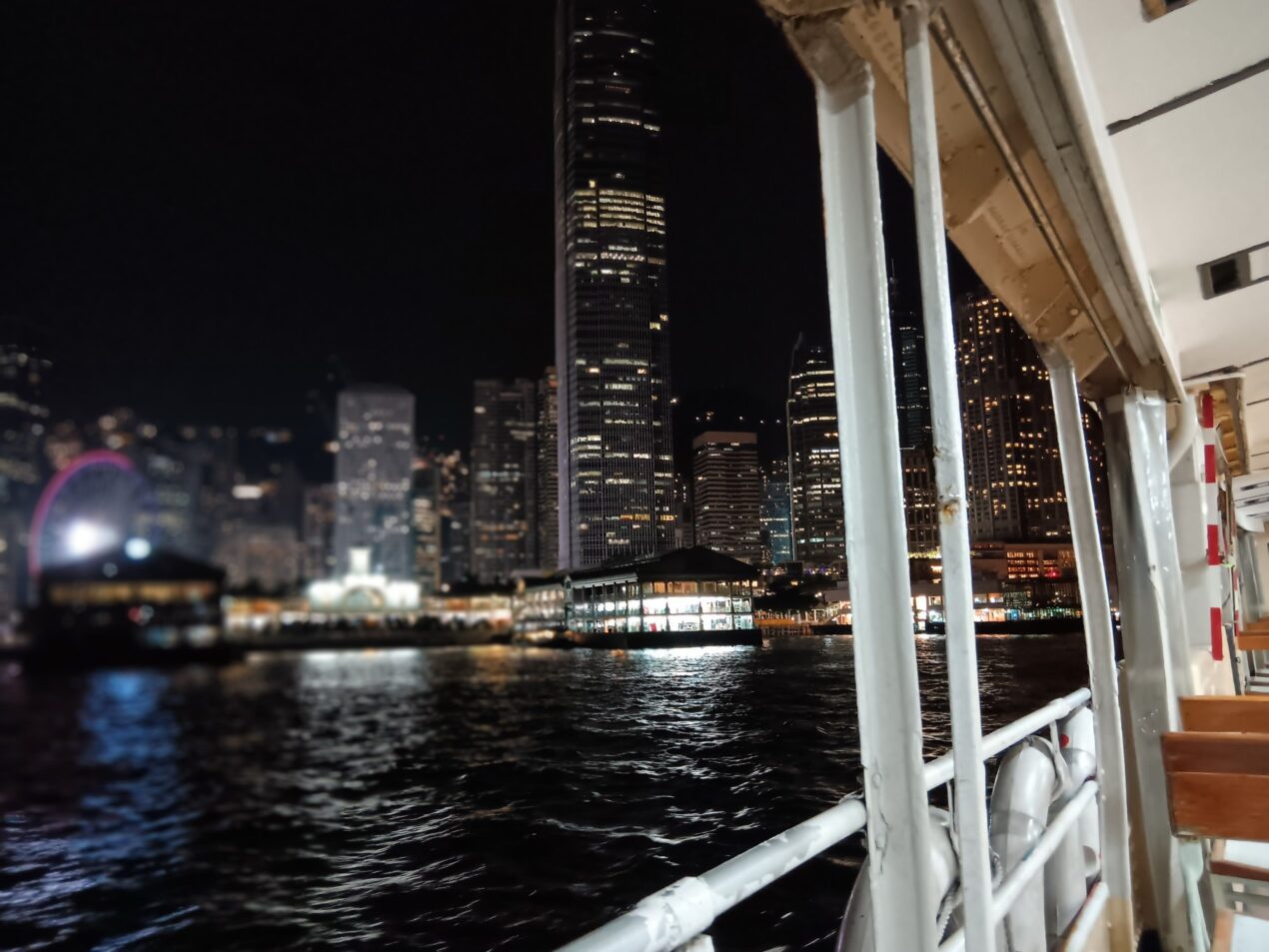Taipei vs. Hong Kong For Expats: Which City is Right For You?
Disclosure! Keep in mind that some links in these posts are affiliate links and if you click one of them, I may earn a small commission (for which I’m extremely grateful) at no extra cost to you. Thanks for visiting!
Hong Kong and Taipei are two popular cities that emerge as top contenders for expats considering moving to Asia thanks to a mix of thriving professional opportunities, personal and social growth, and a plethora of other practical considerations (I’m looking at you low tax rates!).
Having lived in Taipei, Taiwan for over 3 years and Hong Kong for nearly 7 years (hint: I’m currently living in HK) both cities have been incredibly formative both professionally and personally for me, with each providing distinct and unique (and memorable) experiences, vibrant cultures, and unparalleled advantages that have ultimately made my life richer and more fulfilling.
However, they differ significantly in key areas such as cost of living, professional industries, lifestyle, and overall environment. And, in my humble opinion, they cater to two very different types of expats.
Below, I’ll break down the key factors you should consider when asking yourself if Hong Kong or Taipei is the best fit for you.
So, whether you’re drawn to Hong Kong’s solidified and storied reputation as a global financial hub or Taipei’s eclectic blend of modernity, tradition, and island charm, this article will help you evaluate critical aspects that may be most important to you.
So, without further ado – Hong Kong vs. Taipei for expats – which city is best for you, your career, and your family? Let’s find out.
| Factors | Hong Kong | Taipei |
| Cost of Living | One of the most expensive cities in the world. | Affordable across the board, specifically housing and necessities. |
| Professional Opportunities | A leading global financial hub that’s home to high-demand sectors like banking, law, and insurance, with no cap on professional growth. | A foreign job market underpinned by English teaching and other jobs in education, with a growing tech and entrepreneur scene. |
| Quality of Life | A high-pressure and demanding city that comes with long hours but surrounding nature and no shortage of activities to mitigate. | A more balanced and relaxed existence where you can clock-in and clock-out to enjoy surrounding nature and cultural events. |
| Education | World-class competitive international curricula that can cost a pretty penny. | An ideal destination for families seeking Mandarin immersion along with high global standards. |
| Expat Communities | The most eclectic expat community in Asia (and a top global city). | A small but inclusive expat community that is primarily centered around Anglophones and native English speakers. |
Cost of Living
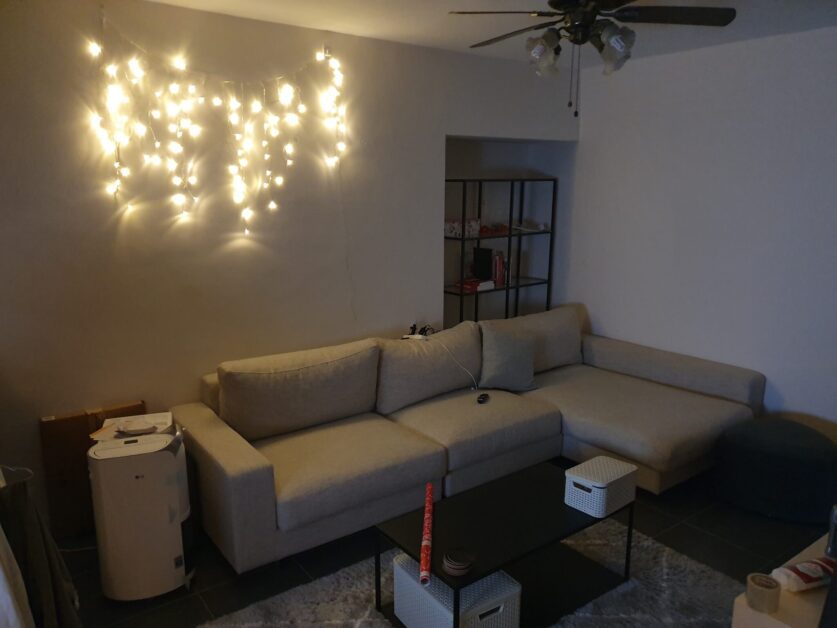
The living room of my former apartment in Mid-Levels, 520 square feet for HK$21,000 per month.
It would be foolish not to acknowledge that the cost of living is an overwhelmingly dominant factor that influences a person or family’s move to a new city or country. For being just 800 km from one another, Taipei and Hong Kong couldn’t be any more different in this regard.
The cost of living was the biggest reason it took me so long to get back to Hong Kong, as it is just not a city that you want to be ‘skint’ in (as the Brits say).
I’m also feeling the heat at the moment while writing this as I don’t particularly have a steady stream of income coming in – so who knows where I’ll end up in the coming years if things don’t turn around!
Housing Costs
How much space do you (and your family) require? If it’s a lot, then one of these cities might not be viable for you.
Hong Kong: Sky-High Rents For Shoeboxes
The reality of Hong Kong’s housing market is that you are going to pay a lot for very little space. That is unless you’re in the top 1% of the 1%, then you’ll be fine. But I’m guessing you aren’t and are very much in the same camp as me.
Hong Kong is renowned/loathed for its exorbitant housing prices, consistently clocking in at the top for most expenses in the world for real estate. Further, apartment and/or house-hunting is an absolute pain in the rear end thanks to stubborn landlords and selfish real estate agents.
- Rental Prices: A one-bedroom apartment in Hong Kong’s city center (ex. Hong Kong Island or Tsim Sha Tsui) will run you HK$12,500 to HK$25,000 per month, with similar apartments in other parts of Hong Kong Island, Kowloon, and the New Territories renting for HK$10,000 to HK$15,000. Larger apartments, family-sized units, and village houses can easily exceed HK$40,000 or more per month.
- Space: Hong Kong apartments are notoriously small and it is definitely more common to come across someone living in an apartment that is 350 square feet or less – especially the more ‘Central’ you are. My current two-bedroom apartment in Mid-Levels is just under 350 square feet and I pay HK$12,700 per month.
- Neighborhood Considerations: Popular expatriate areas like Mid-Levels, Wan Chai, Sheung Wan, and Repulse Bay tend to come at a premium, so if you are budget-conscious and don’t want to break the bank, I recommend looking outside of these areas.
Pale Ale Travel Tip: If you have questions about any specific neighborhood in Hong Kong and what you can expect rent-wise, activity-wise, and more, please don’t hesitate to reach out to me!
Affordable Rent With Slightly More Space
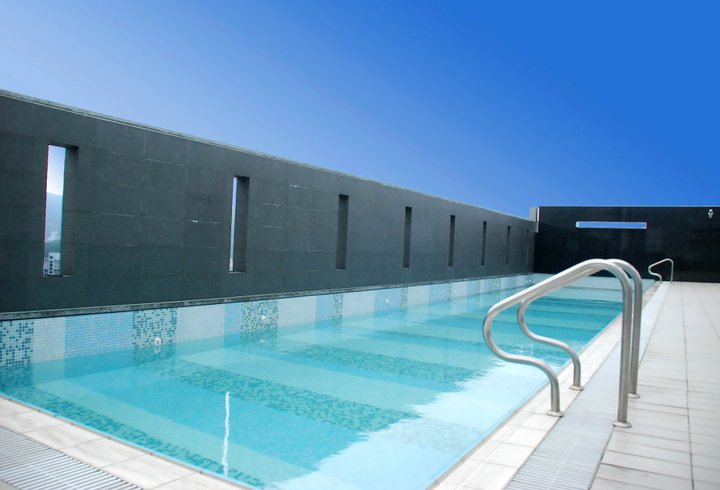
The rooftop pool overlooking Taipei 101 at my apartment in Xinyi District, Taipei. Photo courtesy of Taipei W110’s Facebook Page.
In contrast, Taipei is home to far more budget-friendly and spacious housing options than Hong Kong. However, prices have steadily been increasing over the years, so it isn’t ‘Southeast Asia’ affordable (if you were picturing that).
- Rental Prices: A one-bedroom apartment in Taipei’s city center (ex. Xinyi District) will typically run you NT$12,000 to NT$25,000-plus per month, while similar places outside of the central districts can be found for NT$8,000 to NT$13,000. I lived in an executive studio (loft) ‘luxury served apartment’ that included a rooftop pool, gym, and karaoke rooms in the city center (next to Taipei 101) and paid NT$29,360 per month.
- Space: Taipei apartments are generally more spacious and some even come with balconies and additional storage. Apartments are measured in ‘ping’, a traditional Chinese unit of measurement, which typically equates to an area of 35 square feet (per ping).
- Neighborhood Considerations: Expat-friendly neighborhoods like Xinyi, Da’an, and Dong Qu (East District) offer convenience and comfort at slightly higher prices than the rest of Taipei. However, there are plenty of budget-friendly options scattered across every corner of the city, including Zhonghe, Neihu, Wenshan, and Banqiao.
For both cities, sharing an apartment with someone else can see these prices reduced significantly!
Pale Ale Travel Tip: Make sure to check out both of my articles: (1) How Much Does a Luxury Service Apartment in Taipei Cost?, and (2) How Much Does It Cost to Rent an Apartment in Mid-Levels, Hong Kong?.
Food & Dining
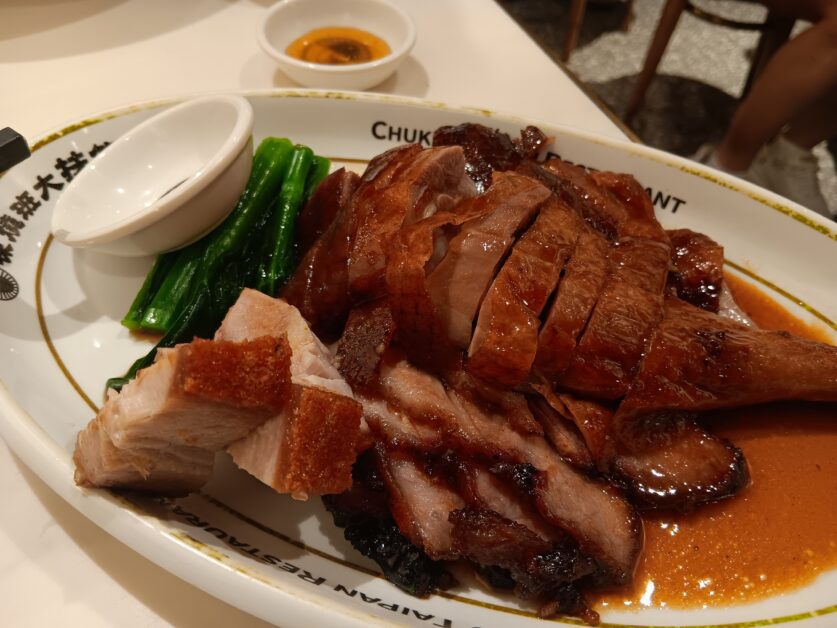
One of the best spots for Cantonese BBQ in Hong Kong – Chukfo Taipan.
While Hong Kong offers a far more international (and internationally acclaimed) gastronomic landscape than Taipei (and Taiwan), I wouldn’t say that’s better, as dining costs can quickly add up in Asia’s World City if you aren’t careful.
Taiwan’s food scene, while less eclectic, prioritizes quality meals that won’t break the bank. There are also numerous international and fine dining spots in Taipei as well (just not as many as in Hong Kong).
Hong Kong: International Acclaim With High Price Tags
But for local Cantonese restaurants like cha chaan tengs, dai pai dongs, siu mei restaurants, cooked food markets, and dim sum institutions, I generally find most restaurants, cafes, and other bites in Hong Kong to be incredibly overpriced and not anywhere worth it when it comes to the quality you get.
Yes, there are Michelin-starred restaurants, fine dining options, brunch haunts, and Western/international restaurants galore. But this isn’t particularly ‘sustainable’ for most expatriates (myself included) to be eating “on the reg.”
- Dining Out: A meal at a mid-range Western/international restaurant in Hong Kong will cost anywhere from HK$150 to HK$300, while local restaurants/takeout spots (ex. Two dish rice spots) can be had for as little as HK$40. Fine-dining restaurants can well exceed HK$1,200 per head (and that’s the bare minimum).
- Street Food: As mentioned above, local favorites like dim sum, pineapple buns (and other pastries), fish balls, egg waffles, and other classic Cantonese fare can be had for as little as HK$20 to HK$60, so there are more than a fair share of budget-friendly options in Hong Kong.
- Groceries: Grocery shopping is more expensive if you go to a traditional supermarket in Hong Kong. This is due to a heavy reliance on imports. Average monthly grocery costs at a supermarket in Hong Kong typically clock in between HK$2,000 per month to HK$3,000 per month for those who like to cook at home. However, this can be drastically reduced by getting your fruits, vegetables, and meats at local wet markets (which are much better quality and far more affordable!).
One type of ‘gastronomic happening’ that I find to be one of the best deals anywhere I’ve been in the world is Hong Kong’s free-flow brunches.
For a set fee, generally ranging from HK$600 to HK$1200, you can enjoy unlimited appetizers, morsels, platters, and even mains (usually a single main though), along with unlimited booze (beer, sake, wine, Champagne, Prosecco, etc…). Cuisines vary, often erring towards Asian-fusion but are some of my top deals in the city.
Make sure to check out my post breaking down the best free-flow brunches in Hong Kong!
Taipei: Affordable & Diverse Cuisine
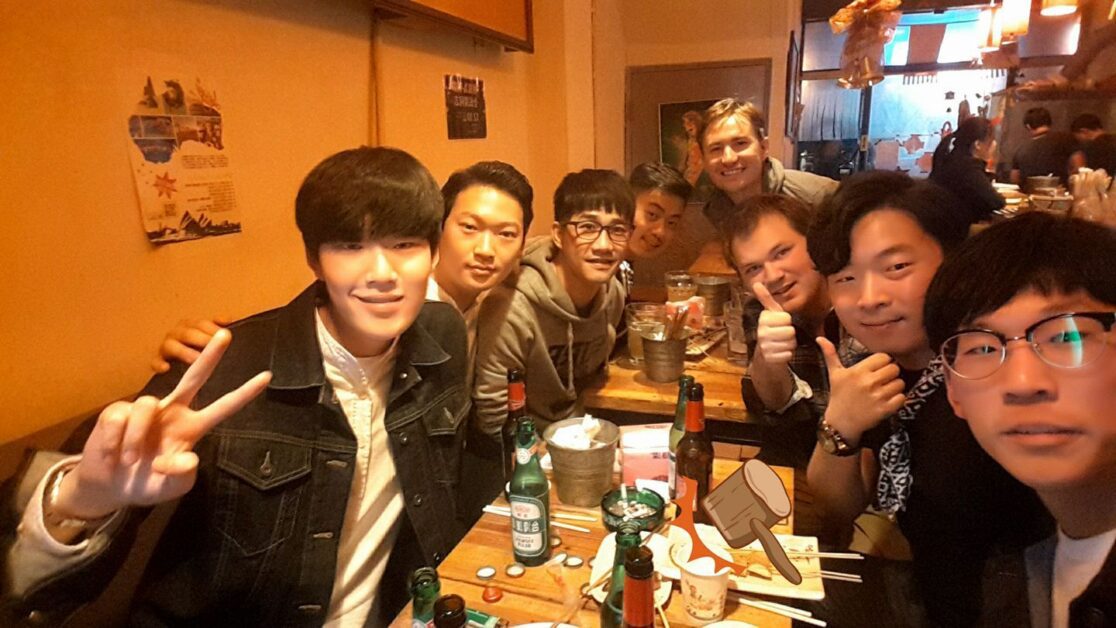
Slugging some beers over Xinjiang skewers at a now closed down spot in Taipei.
Next to Saigon, Osaka, and Bangkok, Taipei is a top contender for one of my favorite cities for food in all of Asia. While the international and Western options aren’t as well stocked as Hong Kong, I’d pit a lot of them against Hong Kong’s international restaurants in terms of quality and affordability.
Oh, and night markets are the best. That’s all you need to know.
- Dining Out: A mid-range international or Asian restaurant in Taipei may cost anywhere from NT$300 to NT$1,000 per person (the latter being much more in line with what I spend as I’m a hungry hungry boy). Fine dining options are also available and what I’d estimate to be 30% to 50% lower than in Hong Kong.
- For example, a favorite tapas/Spanish bar in Taipei (La Mesa – temporarily closed) would see my ex-girlfriend and I run up a bill of roughly NT$3,000 for 7 to 8 dishes and as much sangria as we could put down. This same bill in Hong Kong would be, at minimum, two times this amount.
- Street Food: Night markets are where it’s at for affordable local cuisine in Taipei. From dumplings to fresh juices, grilled squid, stinky tofu, and meat skewers, Taiwanese night markets have it all (I’ve even had Cuban sandwiches at a few). Taipei boasts over 30 night markets, all of which have their own flair and specialties – my favorites being Tonghua Night Market (because I lived right next to it), Shilin Night Market (the biggest of them all), and Raohe Night Market (for quality).
- Groceries: Taipei is located in Taiwan, which is 32 times bigger and exponentially more agriculturally rich than Hong Kong, so locally produced items are much more affordable. There’s also a handful of fresh local wet markets if you want to dial back expenses even more. Monthly grocery bills generally range from NT$6,000 to NT$8,000. However, I had several friends who scaled down to even less and others who saw upwards of NT$15,000 per month (usually those who preferred high-end cuts of meat/seafood).
Pale Ale Travel Note: It’s unfortunate that Hong Kong never developed a night market culture as it is one of my favorite types of spots to eat/peruse/wind down after a long day at work.
One of my favorite types of restaurants/styles of cuisine in Taipei (and Taiwan) is 熱炒 (re-chao), which translates to ‘hot stir-fry’. These are casual homestyle (unpretentious) Taiwanese restaurants where beer flows as freely as classic shareable dishes like deep-fried oysters, sweet and sour fish, garlic-coated clams, tofu, and gongbao chicken. Affordable, communal, and rowdy is how I would best sum these spots up.
I was a frequent consumer of ‘bian dang’ (便當) restaurants during my three-plus years in Taipei. These are self-serve buffet-style restaurants – or sometimes you’ll have a worker stack your plate for you – where you can choose from popular Taiwanese classics like fried chicken, eggplant, sweet and sour chicken, marinated egg, greens and braised cabbage, and more, stacked over piles of rice, all for just a couple dollars (USD).
Picture it similar to how mall Chinese buffet kiosks operate but increase the quality by at least 50x.
Finally, I’d be remiss not to mention that Taipei was the catalyst for my love of Japanese cuisine, as it’s a former Japanese colony and home to countless affordable izakayas, yakitori joints, donburi restaurants, and even a sprawling fish market and restaurant hub called ‘Aquatic Addiction’.
Unfortunately, in Hong Kong, Japanese cuisine, except for ramen, is preposterously overpriced, so it’s only a ‘special occasion’ type of deal for this guy.
Pale Ale Travel Note: While this is purely anecdotal, the best New York-style pizza I’ve eaten in Asia was in Taipei, the best avocado toast I’ve eaten was in Taipei, and the best Spanish tapas I’ve had the pleasure of chowing down on were also in Taipei. So, while Taipei may not be as ‘flush’ as Hong Kong with the sheer number of international restaurants, cafes, and bars, the quality is top-tier (in my humble opinion).
Transportation
Both Hong Kong and Taipei boast two of the best and most affordable public transportation systems in the world, Hong Kong having the MTR and Taipei having the MRT.
You’d be hard-pressed to find a pocket of either city that you can’t reach by way of some sort of transportation in either city – whether it by way of metro, bus, scooter, tram (only Hong Kong), taxi, or even YouBike (only in Taipei).
Convenience isn’t even a question in Hong Kong or Taipei. It’s expected. And both emphatically deliver.
Hong Kong: Surprisingly Affordable in the World’s Most Expensive City
A general rule of thumb is that you can be almost anywhere you want in Hong Kong in no more than an hour. This is all thanks to the Mass Transit Railway (MTR) system, which is the backbone of the city.
The MTR isn’t just a metro, it includes everything from heavy rail to light rail, and buses, with roughly 180 stations scattered across the city.
Fares generally range from HK$3.60 to HK$51, depending on where you want to go, the latter being for long-distance or cross-harbor rides. My several-station MTR commute costs just HK$12 for a round-trip fare with my Octopus card.
Most single-swipe journeys on the New York City subway cost nearly USD 3.
Hong Kong also has an extensive network of minibusses, ferries, and trams, which connect residents and commuters to underserved and nonrepresented areas under the MTR network – ex. Outlying islands like Discovery Bay, Cheung Chau, and Peng Chau, along with pockets like Happy Valley (tram), Shek O (minibus), and Sai Kung (minibus).
Taxis and ride-hailing apps like Uber are also relatively affordable and widespread.
While yes, Hong Kong can be a ridiculously priced city for certain things, transportation ain’t one of them, buddy guy.
Pale Ale Travel Tip: I broke down transportation costs in greater detail in my post ‘Is Hong Kong Expensive?’, which I recommend reading if you want the nitty gritty on getting around Asia’s World City.
Affordable, Convenient, & Connected
Hong Kong is roughly three times bigger than Taipei. However, Taiwan is over 30 times bigger than Hong Kong. That’s some fun little knowledge right there.
So, while Taipei doesn’t have as many transportation options (ex. Ferries and trams), it’s even more compact and convenient to navigate. And, it’s even more affordable than in Hong Kong.
Monthly MRT passes cost roughly NT$1200 for unlimited rides. USD 30 for unlimited rides in the city? It doesn’t get much better than that. Taxis and Uber are everywhere, with taxi base fares starting at NT$85. However, real Taipei residents own scooters (most common are 100-150cc), which can be filled up for anywhere from NT$200 to NT$600 per month depending on how often you scoot around town.
What I especially love about Taipei are the YouBike stations all around the city. Something I’d often ride home after a long day of work and park right outside of my apartment building.
Finally, remember that when you’re in Taipei, you aren’t confined to just staying within the city. Some of my best memories while living there were taking a trip via Taiwan’s High Speed Rail across the country. 5 hours is the absolute maximum it takes to get from Taipei (in the north) all the way down south.
Professional Opportunities & Visas
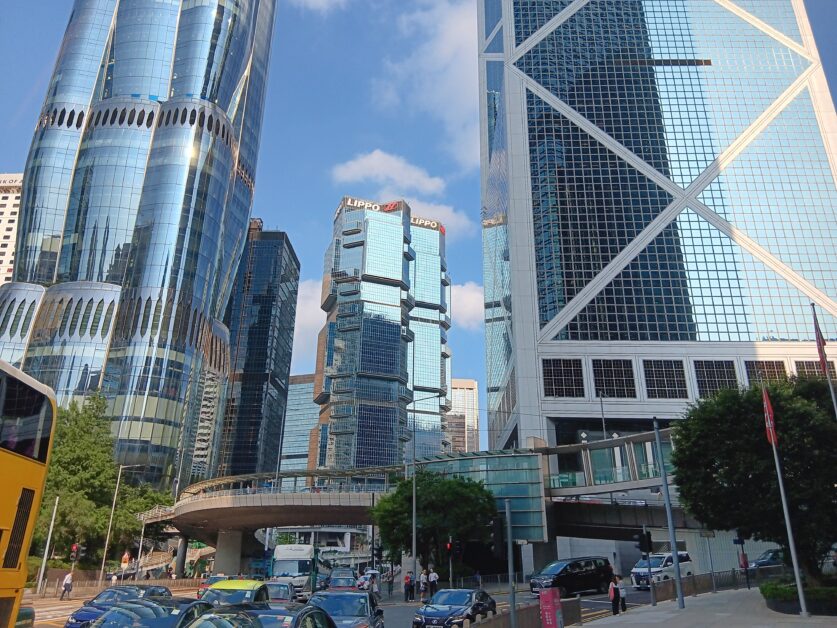
Some of the buildings the movers and shakers of Hong Kong work in.
Cost of living and professional opportunities go hand in hand, with the latter being the key driving factor behind a majority of expat relocations to Asia.
Job Market For Expats
The gist of the job market in both cities is that Hong Kong is a reputed international finance hub and has been since the late 1960s/early 1970s, while Taipei is primarily geared towards English teaching and opportunities surrounding it.
Pale Ale Travel Tip: Hong Kong is so prohibitively expensive (at points) that it isn’t unheard of to pick up a part-time job or a side hustle. Here are the best side hustles in Hong Kong that you can get started with today.
Hong Kong as a Global Financial Powerhouse
Hong Kong’s longstanding reputation as a go-to global financial center has made it a magnet for attracting top talent, especially in high-demand sectors like banking, law, insurance, medical devices, and other financial-related services.
- Key Industries:
- Financial & Banking: This is where careers and fortunes are made in Hong Kong. Investment banking, wealth management, and even fintech are what the city is all about. I’d estimate roughly 70% to 80% of all friends work in finance/banking or in a role that serves it (ex. Marketing, HR, executive recruitment).
- Legal & Professional Services: The city’s robust legal and consulting sectors require specialized professionals with international (and increasingly Chinese) expertise. Pay is also very competitive in these industries. Hong Kong’s legal landscape has become more volatile and unpredictable over the years (due to things I shall not name here), and several high-profile law firms have pulled out of the city.
- Logistics & Trade: As a gateway to China (between East and West) and a major port city, Hong Kong is home to plenty of opportunities in supply chain management, trade, and import/exports.
- Tech & Startups: A growing startup ecosystem has emerged over the years, with dedicated business parks like Cyberport and coworking spaces helping fuel this. Artificial intelligence and blockchain-related companies are popping up left and right, however, due to the prohibitive costs of operating in the city, I’ve found most are dropping off just as quickly.
- Demand For Skills: The general rule of thumb that the Hong Kong government follows when it comes to bringing expats into the city is that they must fill a role and/or provide a specialized skill that isn’t readily available or able to be performed by locals. However, this is a relatively broad rule of thumb and I’ve seen people working in everything from video production to real estate tech, social media, and F&B. Further, Mandarin or Cantonese abilities aren’t required for roughly 99% of expatriate roles.
- Challenges: Hong Kong isn’t just a city that you can “show up in” without a work visa and expect to find work – that’s why it took me so long to move back. Professional opportunities are becoming increasingly to come by and capitalize on, as there has been somewhat of a ‘shake out’ of more international expats in favor of Mainland Chinese workers.
Pale Ale Travel Tip: This is one of those considerations that I understand requires a lot of thought, research, and other due diligence, so if you have any specific questions about professional opportunities/working in Hong Kong, please don’t hesitate to reach out to me at info@palealetravel.com.
Taipei for English Teaching & Emerging Tech
While Taipei’s economy is underpinned by tech and manufacturing, jobs in both are relatively scarce for expats. It’s a city (and country) where most expatriates teach English or work in an education-related position.
- Key Industries:
- Education: English teaching is the overwhelmingly dominant industry taken up by expats in Taipei. There are various tiers to this, with international and private schools clocking in at the top for ‘prestige’ and ‘pay’, and tutoring centers/language centers generally being at the bottom for both.
- Creative Industries & Marketing: Media, design, content creation, and other marketing-related jobs have steadily been on the rise in Taipei, especially as more companies look to expand their global reach/establish an online presence.
- Growing Tech & Startups: Blockchain, AI, cybersecurity, and telecom have seen a significant surge in job opportunities in the last 10 years, with Taipei being hailed as one of the top ‘startup ecosystems’ in Asia (one that is now home to over 400 startups).
- Demand For Skills: But for being able to speak a bit of Mandarin, Taipei generally errs more on the ‘no skill skill’ type of expat destination as you can often just show up and find something. It’s far less of a structured job search and placement ecosystem compared to Hong Kong.
- Challenges: Salaries in Taipei are exponentially lower than in Hong Kong, with career advancement generally never extending beyond your mid to late thirties (ex. It’s diminishing returns after this).
I Have Some Thoughts on Working in Taipei
This may come off as a bit harsh but the most noticeable difference between professional opportunities and growth in Taipei and Hong Kong is that in Taipei, you are extremely capped. The ceiling is not very high unless you start your own company or business.
The reality is that Taipei (and Taiwan as a whole) has low salaries, even for expats and foreigners. These are well below the market rate of what you’d receive in Western countries or truly international cities. Granted, the cost of living is significantly lower in Taipei/Taiwan, so you don’t need an international expatriate salary/package to survive and live well.
For example, professionals in Taipei max out around USD 5,000 to USD 6,000 per month. And that is generally after 10 to 15 years in their profession. These are essentially starting salaries for the lower-end of expats in Hong Kong. Even attorneys that I worked side-by-side with in Taipei were making USD 4,000 per month. These were attorneys with 10+ years post-qualifying experience (PQE).
The second I began freelancing, I earned roughly double what I was making at an international company in Taipei. And I wasn’t even making that much.
This was a major reason I left Taipei.
Pale Ale Travel Note: My above thoughts aren’t a complete dismissal of job opportunities and professional growth in Taipei as plenty of people do carve out their own. But this was a dealbreaker for me and unfortunately, an all too common reality that I saw.
Even teaching salaries in Hong Kong make those in Taipei and Taiwan look like a pittance.
Keep in mind that it isn’t solely keeping yourself afloat while you live in Taipei but after you leave (which most do). What happens when you walk away with savings, investments, and earnings that are a fraction of what you might have elsewhere? And now you are paying Western/international prices for everything.
You just simply won’t be able to afford it and most likely won’t be able to retire in your home country (if a Western country).
My Verdict: If you are content making USD 1300 to USD 4000 per month (the latter being where a lot of people max out), and don’t prioritize financial growth, savings, investments, or professional development and growth, then Taipei is more than sufficient to be an expat in. Further, it’s also great for those in a transition in their life or for those who just want a job that ‘pays the immediate bills’.
Just be careful staying too long if you plan on returning to a more expensive country, as it may be a harsh reality trying to use lower-income wages for higher income comfortability.
If you want to progress in your career, have a transference and leverage of skills, salary, and recognition back in the West, and want to save money that sets you up for a sustainable financial future (and retirement), Hong Kong is emphatically the spot to choose between the two.
Visa & Residency Requirements
While navigating visa and residency requirements is a critical aspect of relocating, it falls in line after finding a job and is taken care of by an employer.
However, both cities offer several different pathways which are important to know in order to maximize your chances of professional (and personal) success and longevity.
Hong Kong: Tied to Your Job Offer
First, there’s a high probability that if you’re reading this, your company from whatever country you’re living and working in has come to you and said that they have an opportunity for you in Hong Kong. Congratulations. The hardest part is done as they will take care of your visa.
If you’re looking to break away from your company, have your own business/company, or start a new career in Hong Kong, don’t worry, there are still options.
- Employment Visa: As mentioned above, this is tied to your job offer. Your employer must demonstrate that the position cannot be filled locally or that you possess special skills that will benefit the Hong Kong economy at large. Visa processing is efficient and generally takes no more than 4 to 6 weeks.
- Quality Migrant Admission Scheme (QMAS): A points-based system that enables highly skilled professionals to legally reside in Hong Kong without securing a job offer beforehand. Points are generally awarded based on age, education, work experience, and language proficiency.
- Investment Visa: Tailored to entrepreneurs, investors, and those who are self-employed. You must show that you can provide a substantial economic contribution to Hong Kong and hire locals. As I’m self-employed, this is the visa I use. You will typically need to first register a company in Hong Kong, which can be done in just several days and for under USD 500.
- Permanent Residency: After seven consecutive (and continuous) years of residence in Hong Kong, expats can apply for a Permanent Residency card, granting them the right to live and work in Hong Kong indefinitely (without needing a visa or being tied to an employer).
Taipei: Less Rigid & Evolving
Taiwan is far less rigid and structured when it comes to obtaining your initial work visa in the country. It’s not unheard of to simply show up in the country, begin teaching at a tutoring/language center, get a visa through them, and then leverage it to find a different job/change careers. This is also what I initially did to move to Taipei/Taiwan.
- Work Visa: To get a valid work visa, this requires a job offer from a local employer. Eligibility depends on academic qualifications, professional experience, and salary considerations. Note: I received a job offer before arriving in Taipei but they told me just to show up on a tourist visa and they’d then process my working visa after arrival.
- Gold Card Program: Sporting a community of over 7,000 professionals from 100+ countries, this 4-in-1 card includes a resident visa, work permit, Alien Resident Certificate (ARC), and re-entry permit. It was introduced to attract skilled professionals, specifically in fields like technology, finance, law, science, and education. Applications take anywhere from 30 to 60 days.
- Entrepreneur Visa: A two-year visa aimed at startups and innovators, this visa requires applicants to demonstrate a comprehensive and viable business plan along with financial backing (funding is generally a major requirement). A plus is that you don’t need to have registered or set up a business beforehand!
- Permanent Residency: After five legal and continuous years (183 days or more each year) of living in Taiwan, expatriates can gain permanent residency, provided they have “considerable property or skills” and it’s in accordance with the country’s “national interest.”
I’m not condoning showing up in Taiwan without a work visa/permit. However, it’s not the end of the world and it isn’t unheard of to show up on a tourist visa and then transition to a work visa. Know that your tourist visa will not count towards the five requisite years for permanent residency.
I’m not condoning this but if you don’t have a job lined up and want to job hunt in Taiwan, it isn’t unheard of to come in on a tourist visa and then transition to a work visa.
Taxes & Financial Considerations
As an American, I’m well aware that a high tax bill can be the difference between living comfortably and making sizable financial strides toward retirement or barely staying afloat and wondering where all your money went at the end of the fiscal year.
Hong Kong: a Low-Tax Haven
Hong Kong has always been seen/regarded as a tax-friendly region/city thanks to its special autonomous region (SAR) status that it was granted. It’s a simple yet competitive tax regime that has been a main draw for expats wanting to get in, make their money (and keep it), and bring a substantial chunk of it back home.
- Income Tax: Hong Kong’s two-tier standard tax rate is capped at 15% of the first HK$5 million of net income and 16% on all income afterward. This progressive system uses a scale of four tax brackets, becoming advantageous for those in the top bracket.
- Other Taxes: Hong Kong doesn’t have value-added tax (VAT), capital gains tax, or inheritance tax. Further, corporate tax is also low, clocking in at 8.25% for profits up to HK$2 million and 16.5% on assessable profits thereafter. For unincorporated businesses, tax is 7.5% for profits up to HK$2 million and 15% for anything exceeding that.
- Double Taxation Agreements: Hong Kong has double taxation agreements/treaties with 51 countries and regions, including Germany, Spain, Italy, the U.K., Japan, and Switzerland, which makes sense considering a lot of people don’t want to be paying for public services and infrastructure that they aren’t enjoying.
The U.S., of course, is not one of those countries that has a double taxation agreement. If you have any questions about how I structure this as an American who has a company in Hong Kong, shoot me a message!
Taipei: Higher Taxes With Comprehensive Coverage
Taiwan operates on a consolidated tax system, which divides personal income into 10 categories, which after consolidation, is then taxed at one of five progressive tax rates.
- Income Tax: Progressive tax rates range from 5% to 40% in Taiwan, with deductions available for dependents, education, and other personal expenses.
- Social Security Contributions: Employees (mandatorily) contribute to both health insurance and pension schemes in Taiwan, with rates depending on income level. More information on this can be found here.
- Other Taxes: VAT is 5% in Taiwan. And, while there is no specific capital gains tax, all gains unless exempted by law, are assessed as ordinary income and subject to standard income tax assessments.
Just to put things into perspective about taxation in Taiwan. Say you are making USD 40,000 as a resident, you will be taxed at 20%. I recommend checking out this user-generated content salary transparency sheet of jobs in Taipei to get a feel for just how much you might stand to make (so you can then figure out what you take home post-tax).
Quality of Life
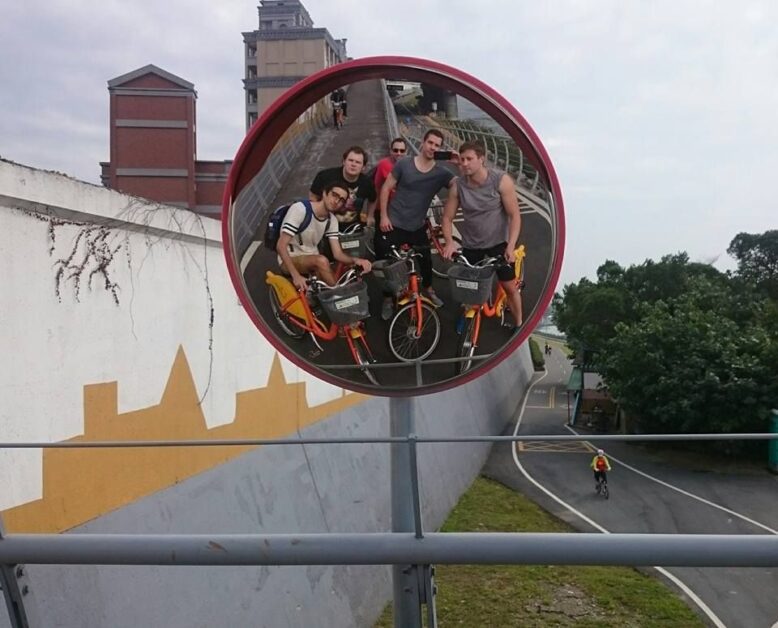
The dawgz on a bike ride out to Dan Shui in Taipei.
Just because you make a lot of money or are working in the job of your dreams doesn’t particularly mean that your quality of life is fantastic.
Three prongs of a sound quality of life that I look for include: work-life balance, access to leisure and entertainment/activities, and healthcare infrastructure.
Hong Kong and Taipei offer contrasting experiences in all three of these areas, catering to different lifestyles and priorities.
Pale Ale Travel Note: I’m not going to get into the respective political situations in both Hong Kong and Taipei. However, it is worth doing some due diligence and research for both to determine if there are any fundamental incompatibilities with what you are comfortable with. Both cities exist (unsurprisingly) facing a similar threat, with one far more acute in its effects and the other somewhat pernicious and yet to see things play out.
Work-Life Balance
What’s it all about if you have a heart attack from stress and realize that you never actually got to stop and smell the roses?
Pale Ale Travel Note: Both Taipei and Hong Kong have numerous national holidays which can help slow things down should you feel yourself needing a breather.
Hong Kong: High-Energy Hustle & Stress
Hong Kong’s reputation as a fast-paced, volatile, high-pressure city is more than well-earned, often coming with long work hours and rigid (and cutthroat) corporate cultures for expats.
Hong Kong embodies the mantra ‘work hard, play hard’ to a T. But that’s also why the professional ceiling is seemingly uncapped, as opposed to in Taipei. It’s just too expensive of a city to “coast in” and the financial pressure often drives many to work like dogs.
It isn’t unheard of to work 60, 70, or even 90-hour weeks in Hong Kong, something more than a handful of my friends are currently doing in their mid-thirties and even early forties. However, this rings far truer in finance, law, and other corporate sectors. There are plenty of people in Hong Kong who have cultivated and maintain a healthy work-life balance.
Pale Ale Travel Note: The people I’ve run into at the various coworking spaces I’ve worked from during the last 5 years typically have a more traditional/healthier work-life balance. However, their earnings (like myself) typically leave a lot to be desired.
The sheer amount of people who work themselves to the bone, burnt out, and call it quits in Hong Kong isn’t an anomaly, it’s far more common than you’d expect. While it isn’t always immediate, stress and burnout are two of the driving factors friends and other expatriates I know cite behind their exodus.
My advice: There are mitigating measures you can take to absorb and alleviate some of the volatility of heavy work schedules in Hong Kong – like getting out of your bubble and exploring other pockets of the city, avoiding boozing like there’s no tomorrow, and knowing when to extract yourself from the city for a change of scenery (ex. Short trip to Taipei, Japan, Korea, Thailand, etc…).
Pale Ale Travel Tip: Make sure to check out my post breaking down 5 things I wish I knew before moving to Hong Kong. No, they are not administrative or financial recommendations. The article tackles several reflections I’d had that have allowed me to carve out a slightly more sustainable Hong Kong for myself.
Taiwan: More Balanced & Relaxed
In contrast, Taipei offers a more laid-back and balanced work environment for expats, something I can’t exactly say for Taiwanese colleagues you may have along the way.
My general rule that I’m pretty confident standing behind is that if you are an expat at a foreign/international company in Taipei, your work-life balance is going to be relatively smooth. However, if you work at a local Taiwanese company as an expat, be prepared to run the work gauntlet.
While I’ve only worked at a U.S.-founded company in Taipei and it was for under a year, from my understanding, it was quite on par with most other expat jobs (outside of teaching/education) – as it was a clock-in and clock-out at 5 PM/6 PM type of deal.
While you’ll inevitably receive less paid leave than you would in Hong Kong, days are nowhere as near as stressful. Local Taiwanese companies generally abide by more traditional and hierarchical structures, so this may mean a less harmonious work-life balance should you find yourself as an expat in a local company.
Further, jobs in education/teaching may overreach when it comes to hours, unpredictable scheduling, and required work on weekends.
When I say that Taipei’s work-life balance is relatively relaxed and balanced, I wouldn’t classify it in the same stratosphere as the Nordic countries.
Pale Ale Travel Tip: I always thought the most formative years of your life would be in high school or university. However, for this Big Body, they’ve occurred post-30. Here’s a post I wrote reflecting on 5 things I wish I had known before moving to Hong Kong.
Leisure, Entertainment, & Activities
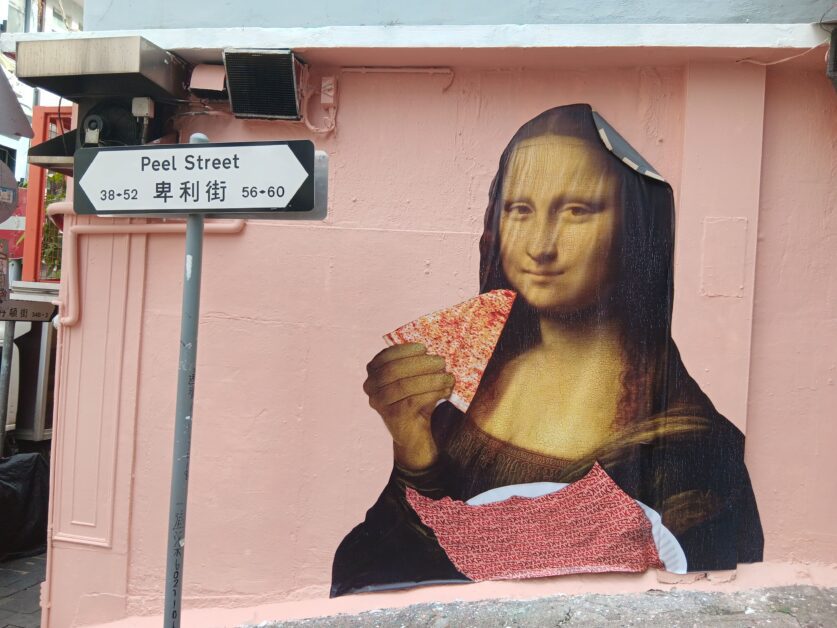
Peel Street is now one of the hotspots for nightlife in Hong Kong.
Both Hong Kong and Taipei have well-planned and convenient layouts (and infrastructure), beautiful surrounding landscapes, and activities for all tastes and budgets, which allow expats to seamlessly integrate work-life balance into their daily routines (if they so choose).
Hong Kong: A City That Never Sleeps
The title of Hong Kong as a city that never sleeps may ring less true than say 10 to 20 years ago but it’s still an incredibly active, bustling, and entertaining city at most hours of the day.
Both Dr. Jekyll and Mr. Hyde would have a blast in Hong Kong.
- Nightlife: From rooftop bars with panoramic views of the best skyline in the world to secluded speakeasies, British pubs and craft beer bars, Italian and French wine bars, righteous shisha haunts, and late-night clubs, Hong Kong’s nightlife caters to both casual revelers and hedonistic Hi-So somebodies. You can find most expats bouncing between SoHo, Lan Kwai Fong (now it’s more of the younger generation), Tsim Sha Tsui (ex. Knutsford Terrace), and Wan Chai.
- Outdoor Activities: Despite its urban density, Hong Kong offers some of the best access to nature of any major city in the world. Picture hikes galore, dozens of gazetted and non-gazetted beaches, and lengthy cycling routes!
- Cultural Events: As Asia’s World City, Hong Kong hosts numerous world-class cultural events, such as Art Basel, the Rugby Sevens, and the Hong Kong International Film Festival. Pile on numerous museums, galleries, and attractions (ex. Nan Lian Garden + Chi Lin Nunnery), and there’s always something happening/something to do in Hong Kong.
- Expat Communities: While I’ll dive into this in somewhat greater detail below, the city’s large expat population fosters vibrant social networks, with daily/weekly meetups, interest groups, and international clubs to join!
The good and bad about Hong Kong is that you can literally fill your schedule every single day and night of the week, which coupled with a hectic and intense work schedule can quickly lead to burnout.
Pale Ale Travel Tip: Many people don’t know that both Hong Kong and Taiwan are home to some incredible hikes. Make sure to check out my article breaking down the top hikes in Hong Kong for explorers of all skill levels. I also recommend checking out my post breaking down the best date ideas in Hong Kong (perfect for singles and friend groups as well) to get a better idea of what the city has to offer!
Taipei: Charming & Accessible
Taipei’s leisure, entertainment, and activity scene is more understated but equally as diverse.
- Nightlife: Taipei’s nightlife combines both traditional and modern elements, which can provide for a more relaxed socializing experience. Kick things off with a few drinks/bites at one of the numerous night markets (Raohe, Shilin, Tonghua, Ningxia) before heading to a trendy area like ATT 4 FUN, Ximending, Daan, or Zhongshan to dance the night away at a club, sip cocktails at a speakeasy, or toss back craft brews from one of the many breweries or craft beer bars!
- Outdoor Activities: Nestled in a basin surrounded by mountains, Taipei is a haven and a fantastic launching point for outdoor enthusiasts. Popular activities like hiking Elephant Mountain (with the best view of Taipei 101), exploring Yangmingshan National Park, soaking in Beitou’s hot springs, and bike rides out to Dan Shui are all literally in your backyard. Accessibility is key here and much like Hong Kong, everything is right at your fingertips.
- Cultural Events: Festivals like Taipei’s Lantern Festival and Taipei Biennial, coupled with a lantern-filled Old Town to the north (Pingxi Laojie), independent art houses and cinemas, and several cultural parks (Songshan and Huashan 1914) are great for experiencing Taiwanese history and cultural richness.
- Expat Communities: While Taipei boasts a significantly smaller expat population than Hong Kong, it’s tightly knit and in general, quite welcoming. This is a contrast to Hong Kong’s often colder, more transient expat community. Don’t just relegate yourself to expat communities in Taipei, so make sure to learn some Mandarin at a language school, exchange, or group! My ex met some of her best friends through language exchanges!
I don’t want to undersell Taipei’s nightlife at all as the dawgz and I, way back in the day (2012/2013/2014), used to book dawgz trips for several days to go party at the clubs. And let me tell you, it definitely went toe-to-toe with Hong Kong in terms of craziness, spectacle, and hedonism (at a far more affordable price too).
Pale Ale Travel Tip: Want to spice up date night in Taipei? Make sure to check out my post breaking down the best date ideas in Taipei. Hint: these are also some of my favorite activities to do solo or with friends – so a partner is NOT required.
Healthcare Systems
Unfortunately, sometimes health can take a downturn while abroad. Or, maybe you have existing ailments and injuries that you want to make sure receive the treatment they deserve.
Both Hong Kong and Taipei provide sound (and world-class) healthcare and medical coverage but at drastically varying price points.
Hong Kong: World-Class But Costly
Hong Kong’s healthcare system is consistently ranked among the best in the world, combining both first-rate public and private options.
Hong Kong’s public healthcare system provides affordable (and subsidized), quality care to expats who possess a Hong Kong Identity Card. However, long waiting times for non-urgent procedures are somewhat common and expected, causing many to opt for private clinics and hospitals.
Quick or luxurious (ex. aesthetic) healthcare costs a premium in Hong Kong, so private health insurance is often essential to cushion these expenses.
One thing I find ridiculous is that as someone who has a lot of moles and needs to worry about skin cancer, the cost for a single mole removal (as it’s considered an ‘aesthetic procedure’) was nearly half of my monthly income.
Further, for any dental work, I just find it more efficient and practical to travel to Thailand for a week-long trip to take care of any periodontal needs at a fraction of the cost.
Finally, as a city at the intersection of East and West, Hong Kong is home to top specialists and cutting-edge facilities and treatments, so you can rest assured that there are one or more medical professionals at the top of their game who are able to assist you (and speak your language).
Pale Ale Travel Note: While I don’t have any children of my own, several friends of mine have gone through the process of giving birth in the city, praising its high-quality and affordable prenatal healthcare as a godsend.
Taipei: One of the Best in the World For 99% of Its Residents
Taiwan’s healthcare system is renowned for its affordability and efficiency, primarily thanks to its National Health Insurance (NHI) program.
- National Health Insurance: All residents in Taiwan, including expats, are required to enroll and pay into NHI. This single-payer system provides comprehensive medical coverage at incredibly low costs, which covers doctor visits, hospital stays, and prescriptions.
- Language Considerations: English-speaking doctors and specialists may be more difficult to find compared to Hong Kong. However, larger international hospitals and clinics often cater to English speakers.
One quote that always stuck out to me in Taiwan’s national healthcare system is that for 99% of normal people on average salaries, it’s a contender for the best in the world. However, for the 1%, the U.S. is still far better in terms of quality and treatment (at a highly marked-up price).
While Taiwan’s National healthcare system is widely praised for its affordability, having put my national health insurance to the test while there, I found it was far more efficient/better to shell out the extra money and visit a private healthcare provider.
National healthcare systems are affordable, yes, however, I often found myself waiting for nearly a whole day (and would have to take an entire day off of work) just to get a simple medical check-up and/or visit the doctor should I have something pop up. I also noticed how doctors/specialists just aim to see as many patients as they can per day and as quickly as possible.
Several friends of mine living in Taipei experienced the opposite, so it may just be case-dependent.
Education, Language, & Expat Communities
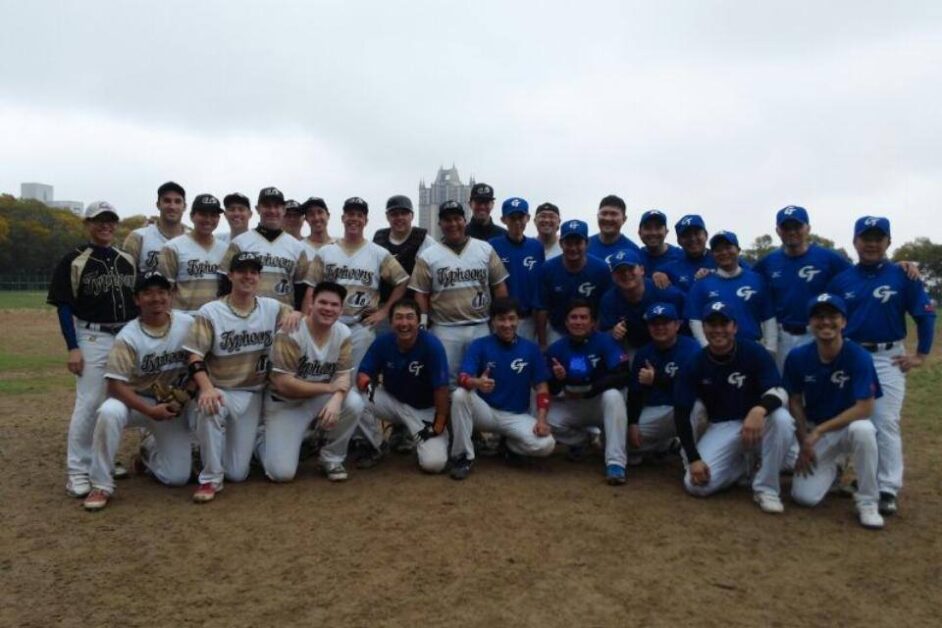
A blend of both spots I lived in. One of the best things about moving to Hong Kong in 2012 was the baseball team I played on.
For expats moving to Hong Kong or Taipei, I see the ease of integration boiling down to three two key factors: language barriers and the presence of supportive and/or growing expatriate communities.
Education and family-friendly amenities are also crucial for those moving over with a “whole team” or those planning on starting a family.
Education
Whether it’s Hong Kong or Taipei, your kids will have a top-tier education. Both offer countless local and international school options, encompassing nearly every type of curriculum under the sun.
Hong Kong: World-Class, Competitive Education
Hong Kong’s education system sports a robust education system that spans both top local and public schools in Asia along with rigorous international schools and other private institutions.
- International Schools: With over 50 international schools (and over 80 with some form of international curriculum), Hong Kong offers a curriculum for nearly every major nationality, including British, American, German, French, and Australian. Competition can be fierce and tuition fees extraordinarily high (ex. USD 20,000 or more per year), so keep this in mind when negotiating a comprehensive package with your employer when relocating.
- Public & Subsidized Schools: Hong Kong public schools are highly regarded but follow a strict curriculum steeped in Chinese language and culture, which may be less than ideal (and hard to navigate) for non-Cantonese speaking expats. Subsidized schools provide a nice middle ground, offering bilingual education in both English and Cantonese.
- Higher Education: Asia’s World City is home to several globally ranked universities, including the University of Hong Kong (HKU), The Chinese University of Hong Kong (CUHK), and the Hong Kong University of Science and Technology (HKUST), often at a fraction of the price of American universities, which is attractive for expats who want their children to attend a top university without coming out eyeballs deep in debt.
I completed a post-graduate degree at a university in Hong Kong and found it to be extremely competitive, comprehensive, and effective in preparing me for future professional endeavors – something I can’t say about several other universities of high learning I’ve attended.
Taipei: Affordable & Mandarin-Oriented
Taipei is the perfect spot for expats looking to raise bilingual children, specifically those fluent in Mandarin. While there are several international, religious, and private schools in the city, the real strength lies in a full Mandarin immersion that also follows high global standards.
- International Schools: As of the date of publication, there are just under 20 international schools in Taipei, including Taipei American School, Taipei European School, Taipei Japanese School, and Taipei Korean School, offering curricula like IP and AP. These international schools are generally less expensive than those in Hong Kong but still can cost a pretty penny (ex. USD 10,000 or more) compared to schools in the West.
- Public Schools: These are a great option for expats in Taipei who want their children to integrate into a Mandarin-speaking environment. Most public schools provide Mandarin as a second-language support for non-native speakers to ease the transition. Local public schools are more traditional and thus, high-pressure and strict.
- Higher Education: Taiwan universities, like National Taiwan University (NTU), are recognized for academic excellence, especially in subjects like technology, engineering, and medicine. Compared to the United States, tuition fees are highly affordable, and courses/majors in English are becoming more widespread.
Language Barriers
While both Hong Kong and Taipei are relatively easy to navigate, one of the two can be strikingly more difficult and frustrating if you don’t establish a bare minimum proficiency of the lingua franca.
Hong Kong: English as a Common Ground (and Crutch)
As a former British Colony, English was the sole official language of Hong Kong until the late 1970s. Now, it’s both English and Cantonese. English is widely spoken throughout central hotspots of the city, particularly in business, legal, and government settings.
Hong Kong’s English ubiquity makes it a highly navigable and comfortable city. Too comfortable some might say as it is relatively common for expats to go their entire tenure in Hong Kong without learning more than “Hello” and “Thank You” in Cantonese.
Mandarin is increasingly gaining traction in schools and workplaces due to the reunification with China and the entry of more Mainland Chinese professionals and families.
I’ll be honest with you. My Cantonese isn’t great. I took 3 months of daily Cantonese classes several years ago, so I have a baseline of phrases/understanding that I can always whip out in certain situations. But to say that it’s required to live a fulfilling, functional, and productive existence in Hong Kong would be a lie.
My friends span every end of the spectrum in this regard. I recommend learning enough Cantonese to communicate at a basic level, as it’s respectful and it can go a long way and open your life up/create more meaningful connections with people you see regularly.
Taipei: It’s Not Manda(rin)tory But Will Make Your Life So Much Easier
Almost every part of your everyday life will revolve around Mandarin Chinese in Taipei.
Yes, I know more than a handful of expats (and worked alongside them) who had lived in Taipei for decades and didn’t even know how to say their home address in Chinese, but you don’t want to be that person.
I’m not saying you have to become fluent but it’s worth taking a crash course in the language or even doing a few lessons of Duolingo.
I get it, you may very well be a 45-year-old expat with a family starting a new chapter and the last thing you want to do is learn a new language. But even just dedicating several weekends to learning basic phrases, your address, and several foods/dishes will make settling down so much easier.
Because of the Mandarin-centric daily interactions, it’s one of the best cities in the world to learn, study, and “master” the language.
You’ll eat and drink better, you’ll meet more people, and life will be more convenient. Also, your dating pool will exponentially increase (if you’re single).
There’s a handful of language centers like the Mandarin Training Center at National Taiwan Normal University which are popular for both students and expats – with lessons/courses focusing on practical and business Mandarin for the latter.
Taiwan’s younger generation can typically get by in English and may surprise you with their fluency but I still stand by the rule that 80% to 90% of your interactions will be in Mandarin.
If you work at an international company and are brought over as an expat, you most likely won’t be expected to learn Mandarin or use it at work.
Expat Communities
Whether you’re seeking dynamic professional networks or the warm, supportive, nostalgia and comfort conjured up by spending time with your fellow countrymen/countrywomen, the expat communities in Hong Kong and Taipei vary drastically.
Hong Kong: Diverse & Well-Established
Are you Finnish? Spanish? English? Canadian? South African? American? Ghanaian? Filipino? Insert most nationalities from across the world here. There’s most likely a non-zero expat community that exists in Hong Kong for whatever nationality you are.
Scratch that. Non-zero is the wrong word. There’s probably a thriving expat community of that nationality in Hong Kong.
Hong Kong’s expat community isn’t just one of the most eclectic in Asia, it’s one of the most eclectic in the world, encompassing a healthy mix of professionals (new and established), families, and entrepreneurs from across the globe – all of whom have carved out their own little pockets of the city (ex. Sai Ying Pun being popular with French expats).
In fact, roughly 10% of Hong Kong’s resident population is non-local, making it a hub for those wanting to easily find tailored support systems, social networks and contacts, and cultural events and experiences.
I suspect that on top of Hong Kong being a former British colony, the major industries that power the city, such as banking, law, and insurance, are a driving factor behind why you find more than just Anglophones and native English speakers.
Honestly, if you only wanted to go the entire day in Hong Kong speaking French, you could feasibly do so, along with English, German, Mandarin, and even Italian.
Pale Ale Travel Note: Anecdotally, I’ve noticed that American expats have been on a steady decline over the years. I started with a group of primarily American friends roughly 12 years ago and currently only have 1 to 2 left.
Taipei: Welcoming & Close-Knit
Taipei’s expatriate population is drastically smaller than Hong Kong’s (roughly 70,000 foreign-born workers) and definitely errs on the side of more Anglophones and native English speakers due to the overwhelming number of jobs for foreigners that are based around the language (teaching).
Specifically, it’s a heavy concentration of Americans, Brits, Canadians, and Australians.
One major difference I’ve noticed though in nationality representation between Hong Kong and Taipei is that there are generally far fewer South Americans in Hong Kong than there are in Taiwan – something which boils down to diplomatic relations and also what I suspect is the recognition of Taiwan as an independent country.
But it isn’t just foreign-born workers that add to the ‘expat communities’, there are over 100,000 foreign students in Taipei alone (although not technically considered ‘expats’).
I suspect that with Taiwan’s carving out of the Entrepreneur visa and Gold Card program, on top of an already burgeoning tech scene, Taipei is well on its way to becoming more and more multicultural and international in the coming years.
Pale Ale Travel Tip: Hong Kong has always been a second home to me. That doesn’t mean it doesn’t have its own challenges and stresses. Here’s my breakdown of the top pros and cons of living in Hong Kong.
Hong Kong vs. Taipei – Which City is Right For Me?
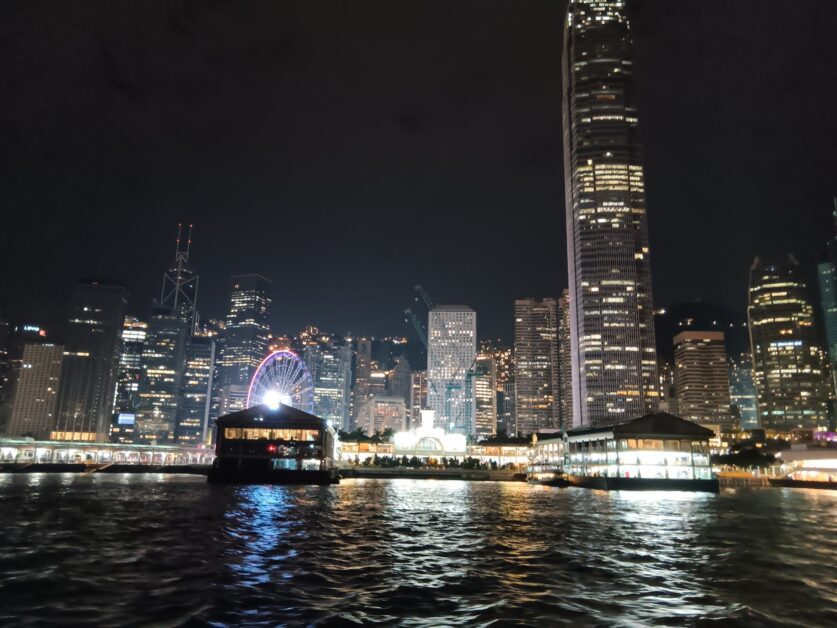
Still my favorite skyline after all these years (Hong Kong).
At the end of the day, the answer to whether Hong Kong or Taipei is right for you as an expat boils down to your specific professional and personal requirements. However, there are several rules of thumb that I would sum things up with.
For example, if you work in finance, law, or another major industry and want a bustling international city that doesn’t stop, where professional growth, earnings, and savings are uncapped, and you don’t mind an intense or stressful work life (or lack of work-life balance), then becoming an expat in Hong Kong might be right for you.
If you work in education or are an entrepreneur, want to learn a new language, don’t mind a smaller expat community, and want a more relaxed pace of life, then moving to Taipei as an expat may be the right option.
Fortunately, both cities offer incredible access to nature, entertainment, activities galore, full-bodied gastronomic scenes, and high-quality healthcare, which is already appreciably more than most hometowns or home cities you may be moving from.
Hong Kong and Taipei were (and still are) currently formative in my life and have overall been incredibly positive for both my professional and personal growth and happiness, so I am deeply thankful for both.
Wow. That was a lot, huh? If you have a specific question and don’t want to read through all 9,000 words, I completely understand, so just reach out to me at info@palealetravel.com and I’m more than happy to shed further light on anything I can.
Be well everyone,
Big Body
Big Body is a voracious lov…eater, a cowardly fighter, and a self-proclaimed curry goat BBQ-eating champion (don’t forget the donkey milk) who likes Stoicism, baseball, and writing in the third person. Having worked for himself for the last 7 years, he isn’t particularly successful but he does still drink ice-cold Sapporo draft beers with the best of them and knows his way around a Dai Pai Dong or two. He is based in Hong Kong but you can still find him in Saigon, Osaka, and Vienna for extended periods.
